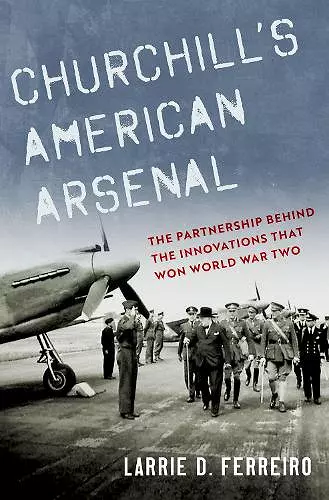Churchill's American Arsenal
The Partnership Behind the Innovations that Won World War Two
Format:Hardback
Publisher:Oxford University Press Inc
Published:3rd Oct '22
Should be back in stock very soon

Churchill's American Arsenal reveals how the technology, know-how, and production power behind the victorious Allied partnership during World War II extended beyond the battlefront and onto the home-front. Many weapons and inventions were credited with winning World War II, most famously in the assertion that the atomic bomb "ended the war, but radar won the war." What is less well known is that both airborne radar and the atomic bomb were invented in British laboratories, but built by Americans. The same holds true for many other American weapons credited with the Allied victory: the P-51 Mustang fighter, the Liberty ship, the proximity fuze, the Sherman tank, and even penicillin all began with British scientists and planners, but were designed and mass-produced by American engineers and factory workers. Churchill's American Arsenal chronicles this vital but often fraught relationship between British inventiveness and American technical might. At first, leaders in each nation were deeply skeptical that such a relationship could ever be successful. But despite initial misunderstandings, petty jealousies, and continuing differences over priorities, scientists and engineers on both sides of the Atlantic found new and often ingenious ways to work together, jointly creating the weapons that often became the decisive factor in the strategy for victory that Churchill had laid out during the earliest days of the conflict. While no single invention won the war, without any one of them, the war could have been lost.
Churchill's American Arsenal should be essential reading for every officer aspiring to higher rank and required for every general officer independent of branch or duties. * Association of the United States Army *
Exhaustively researched, this reflection on ingenuity, scientific development and transatlantic co-operation is a welcome addition to World War II literature. * History of War *
A serious academic, well referenced work that would inform anyone interested in the course of the Second World War. * , The Army Rumour Service *
Brilliant analysis * Nick Smith, Engineering and Technology *
fascinating * Dr Alyson Hitch, The Bay *
I much enjoyed Churchill's American Arsenal. My grandfather Winston Churchill believed in forging alliances and fostering innovation. This book celebrates the principles by which he lived and led. * Celia Sandys, granddaughter and biographer of Winston Churchill *
A terrific 'history in the middle' that focuses on the innovators who worked between the leaders and the front lines. * Robert Work, former Deputy Secretary of Defense and author of 20YY *
Ferreiro has penned another masterly history. A lively account of the vast and vital partnership between American and British scientists. * Jamie Holmes, author of 12 Seconds of Silence *
A brilliant analysis of the critical role played by inventive minds and massive machine shops in winning the Second World War. Ferreiro combines technological expertise with historical insight to assess the complex (and occasionally troubled) relationship between individuals and nations that enabled Britain and America to triumph. * Andrew Lambert, author of Seapower States *
Ferreiro brings the sensibilities of engineering and design to this brilliant discussion. Bravo! * John T. Kuehn, author of Agents of Innovation *
Gripping and well-researched, Ferreiro's book traces the extraordinary history of Anglo-American cooperation in the Second World War. By illuminating gamechanging events from the past, it gives us a guide to the promise and practice of such cooperation in future wars and crises. * Tami Davis Biddle, author of Rhetoric and Reality in Air Warfare *
An accessible and rich account of collaboration across the Atlantic. * David A. Mindell, author of Our Robots, Ourselves *
Ferreiro delivers a powerful book that is timeless in the lessons it offers—past, present, and future. * James P. Delgado, author of War at Sea *
Insightful, original, and infinitely readable, this is a must-have! * John F. Shortal, author of Code Name Arcadia *
Accessible and very readable * Trevor Taylor, The RUSI Journal *
Americans who think that the US arsenal of democracy single-handedly defeated the Axis are gravely mistaken about the past, and poorly positioned to think about the future. Better security will come not from insular efforts, but from strong alliances and transnational collaborations. * Mark R. Wilson, War in History Book Reviews *
ISBN: 9780197554012
Dimensions: 164mm x 242mm x 36mm
Weight: 821g
432 pages